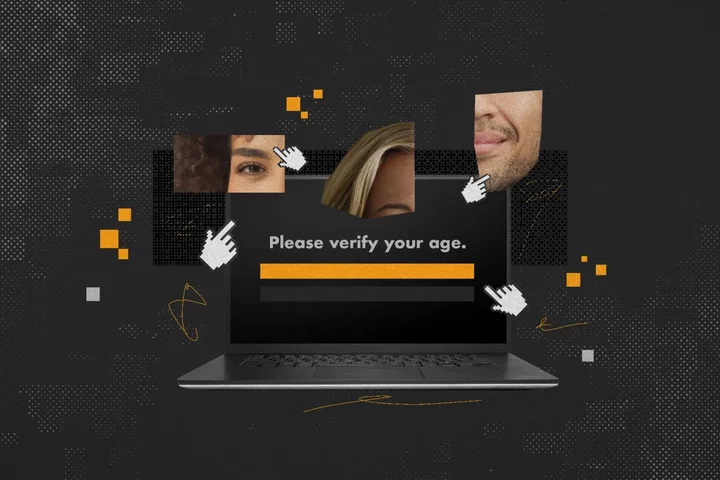Visitors to online porn sites would have had to verify their age under a bill that died last week in the California Legislature. Illustration by Miguel Gutierrez Jr., CalMatters; iStock
A bipartisan bill that would have required Californians to prove they’re adults to visit pornographic websites has died in the Senate amid concerns of potentially high costs and infringements of First Amendment rights.
Under Assembly Bill 3080, California would have joined several other states, most with conservative legislatures, that recently passed similar laws requiring some form of age verification to access online pornography.
In July, the U.S. Supreme Court agreed to hear the adult entertainment industry’s challenge to a similar law Texas enacted last year.
Despite the legal uncertainties and the prospect of liberal California aligning itself with conservative states on porn policy, the bill, by Modesto Republican Juan Alanis, had two Democratic coauthors, Sen. Susan Rubio of West Covina and Assemblymember Pilar Schiavo of Santa Clarita Valley.
It coasted through the Assembly without a single member of either party voting “no,” according to the Digital Democracy database. It passed the Senate’s Judiciary Committee unanimously in early July.
But last week, the bill did not make it out of the Senate Appropriations Committee, where it was held in what’s known as “the suspense file,” along with dozens of other controversial or costly bills.
Alanis, a former crimes-against-children detective, wasn’t happy.“This bill deserved a vote from the full Senate,” he said in a statement. “Once again, Sacramento lobbyists convinced a very few, select, powerful elected members of the Senate Appropriations Committee to make a decision to stand with those who have no problems with harming kids for greed. They should have made the courageous decision to join the overwhelming majority of my colleagues in the Legislature who would have voted to stand with our kids instead.”
The bill would have required porn websites take “reasonable steps” to ensure visitors are adults, such as having them enter a credit or debit card.
The committee’s analysis cited “potentially significant cost pressure to the state-funded trial court system” if regulators had to enforce the proposed rules. The committee noted California’s courts are facing millions of dollars in budget cuts as the state addresses a $30 billion deficit this year.
The bill also faced opposition from influential online privacy and civil liberties groups, including the Electronic Frontier Foundation and ACLU California Action. Opponents testified that the age verification requirement would violate the First Amendment and that the “more data collected, the greater the chance such data gets into the hands of bad actors.”
The Free Speech Coalition, a porn industry trade group, initially opposed the bill, but the coalition removed its opposition this summer as the bill was amended. Alison Boden, the coalition’s executive director, on Tuesday thanked Alanis for his willingness to address the porn industry’s concerns.
“We completely agree with the need to keep minors from accessing age-inappropriate content without unintentionally blocking millions of adult consumers,” Boden said in a statement. “We continue to believe this is possible and look forward to working with him and other members of the Assembly in future sessions.”
The bill’s analysis earlier this year noted that the initial measure was based on “model legislation” from the Center for Renewing America, a conservative activist group.
The organization’s website lists its motto as “For God. For Country. For Community.”
###
CalMatters.org is a nonprofit, nonpartisan media venture explaining California policies and politics.

CLICK TO MANAGE